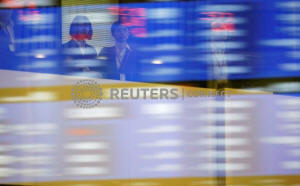|
Stocks splutter as oil races to near
six-month high
 Send a link to a friend
Send a link to a friend
 [April 23, 2019]
By Marc Jones [April 23, 2019]
By Marc Jones
LONDON (Reuters) - Oil prices jumped to
near six-month highs on Tuesday as the United States tightened sanctions
on Iran, sending shares of energy companies higher but largely failing
to help the currencies of the main crude-oil producers.
News that the U.S. had told buyers of Iranian oil to stop purchases by
May 1 or face sanctions pushed Brent toward $75 a barrel and made for a
lively return from the four-day Easter break for Europe's markets. [O/R]
Oil and gas shares jumped more than 1.7 percent for their best start in
six weeks, though almost every other sector suffered. So did bonds, as
higher energy costs hung over profits and nudged up inflation
expectations. [.EU][GVD/EUR]
Foreign-exchange market volatility was still largely absent. The dollar
held near a three-week high, but the usual beneficiaries of higher oil
prices, the Canadian dollar and Norwegian crown, dipped to $1.33 and
$8.52 respectively. [/FRX]

"Oil is interesting, but the interesting thing for FX is that we are not
getting the usual feed-through in the petrocurrencies," said Saxo bank's
head of FX strategy, John Hardy, adding that might be caused by
questions about Chinese stimulus.
Both the Canadian dollar and the crown had gained on Monday, and the
Russian rouble, another petrocurrency, hit its highest against the euro
in more than a year its highest against the dollar in a month.
Overnight, MSCI's index of Asia-Pacific shares ended 0.1 percent higher
and Japan's Nikkei closed up 0.2 percent. Oil and gas gains were offset
by losses for airlines and other transport shares facing higher fuel
costs.
The White House said after its Iran move it was working with Saudi
Arabia and the United Arab Emirates to ensure oil markets were
"adequately supplied," but traders had already been worried about tight
supplies.
Oil prices are up nearly 50 percent since late December, and before the
re-imposition of sanctions last year Iran was the fourth-largest
producer among the Organization of the Petroleum Exporting Countries, at
around 3 million barrels per day.

[to top of second column]
|

Visitors are seen as market prices are reflected in a glass window
at the Tokyo Stock Exchange (TSE) in Tokyo, Japan, October 1, 2018.
REUTERS/Toru Hanai

Oil prices are "not so high that it crushes manufacturing by putting
energy-price inputs up, but it is producing a nice boost to
oil-producing nations," said Robert Carnell, Singapore-based chief
economist and head of research for Asia Pacific at ING.
Carnell sees Brent crude's sweet spot at between $65 and $75 per
barrel: "Above this, you may see some negative impact."
SRI LANKA
Sri Lanka's stock market and government bonds both fell as trading
resumed after bombings had killed more than 300 people on Sunday.
Tourism is likely to collapse, which would deal a serious blow to
the island's economy and financial markets.
The International Monetary Fund last month extended a $1.5 billion
loan to Sri Lanka into 2020, a key step in keeping foreign investors
involved in what so far this year has been a top-performing frontier
debt market.
In China, major benchmarks dipped in and out of negative territory
amid concern that Beijing will slow the pace of policy easing after
unexpectedly strong first-quarter economic data last week.

China's blue-chip stocks have surged over 30 percent so far this
year on expectations of more stimulus and hopes Beijing and
Washington will reach an agreement to end their nine-month trade
dispute.
"We've had a fantastic run in Chinese equities year-to-date. Some
profit taking is completely normal. I don't think China is changing
its policy that quickly," said Stefan Hofer, chief investment
strategist at LGT Bank Asia in Hong Kong.
(Additional reporting by Noah Sin in Hong Kong and Tomo Uetake in
Tokyo; editing by Larry King)
[© 2019 Thomson Reuters. All rights
reserved.]
Copyright 2019 Reuters. All rights reserved. This material may not be published,
broadcast, rewritten or redistributed.
Thompson Reuters is solely responsible for this content. |